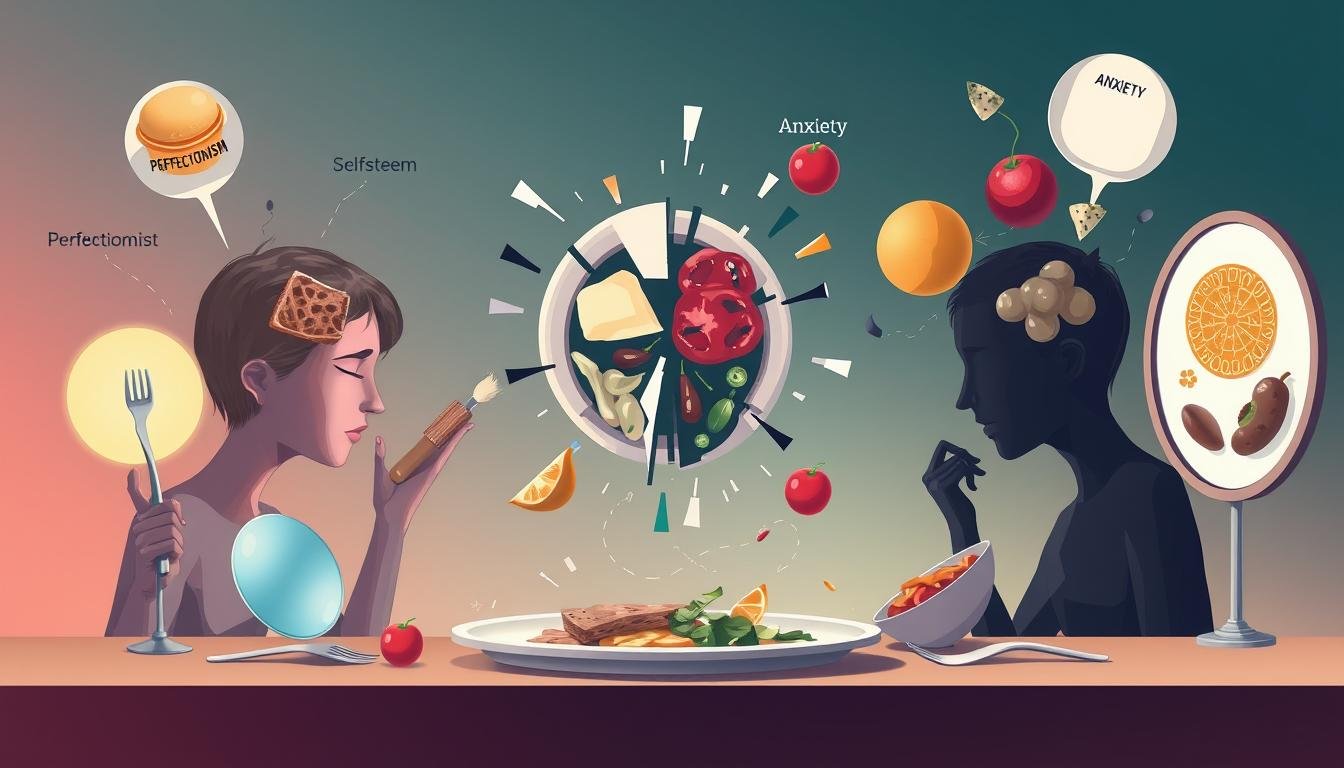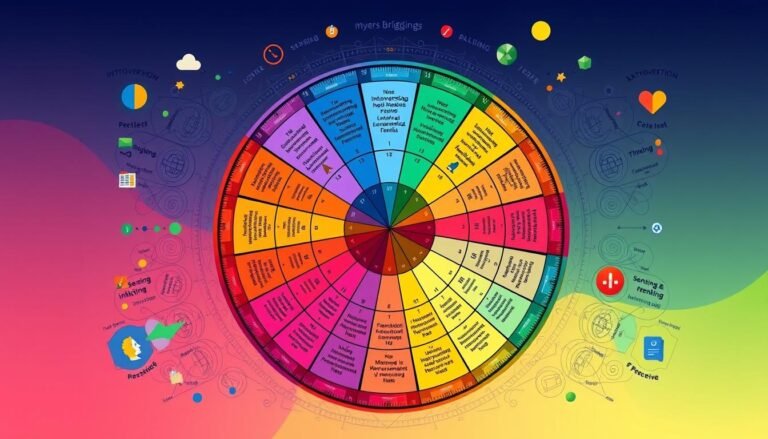Personality and Eating Disorders: Understanding Links
Emma looked at her reflection, focusing on every detail of her body. Her drive for perfection had turned into an unhealthy obsession with her looks and eating. Her story is common among those with certain personality traits, showing how personality and eating habits are linked.
Studies show that personality traits are key in the development of eating disorders. These conditions affect up to 15% of people worldwide. It’s important to understand how personality traits and eating behaviors are connected to help early and effectively treat these issues.
Research finds that specific personality traits are linked to different eating disorders. For example, people with anorexia nervosa often have high neuroticism and perfectionism. Those with bulimia nervosa tend to be more impulsive. These traits can affect when and how eating disorders start and how they are treated.
Personality also affects eating behaviors beyond diagnosed disorders. Many people have unhealthy eating patterns that don’t meet full clinical criteria but still harm their mental health. By studying the relationship between personality traits and eating behaviors, we can find better ways to prevent and treat these issues.
Key Takeaways
- Eating disorders affect up to 15% of the global population
- Personality traits play a crucial role in eating disorder development
- Neuroticism and perfectionism are linked to anorexia nervosa
- Impulsivity is often associated with bulimia nervosa
- Understanding personality-eating disorder links aids in prevention and treatment
- Disordered eating behaviors exist on a continuum from normal to clinical
Introduction to Personality and Eating Disorders
Eating disorders are complex conditions. They are influenced by psychological traits and body image distortions. Understanding the link between personality and eating disorders is key for effective treatment and prevention.
Defining Eating Disorders and Personality
Eating disorders are mental health conditions. They are marked by abnormal eating habits and severe distress about body weight or shape. Personality refers to the unique set of traits that shape an individual’s thoughts, feelings, and behaviors.
The Importance of Understanding Their Connection
Research shows a strong link between personality traits and eating disorders. For example, obsessive-compulsive personality disorder is present in 22% of individuals with restrictive anorexia. This is compared to 8% in the general population. This connection can inform treatment approaches and improve outcomes.
Overview of Current Research Findings
Studies reveal that people with eating disorders often display distinct personality profiles. A study of 208 female patients with non-anorexic eating disorders found they exhibited higher levels of negative affectivity and vulnerability. They also showed lower levels of warmth, sociability, trust, and self-discipline.
| Personality Trait | Impact on Eating Disorders |
|---|---|
| Perfectionism | Strongly linked to eating disorder development |
| Neuroticism | Higher levels in eating disorder patients |
| Extraversion | Lower levels in eating disorder patients |
| Agreeableness | Lower levels in eating disorder patients |
These findings highlight the complex interplay between personality and eating disorders. They emphasize the need for personalized treatment approaches. These should address both cognitive distortions and underlying psychological traits.
The Five Factor Model of Personality
The Five Factor Model (FFM) is a key part of personality assessment. It divides psychological traits into five main areas: Openness, Conscientiousness, Extraversion, Agreeableness, and Neuroticism. It’s used a lot in studies of character and helps us understand human behavior.
A recent study looked at 2523 records and 45 papers. It found that high Neuroticism scores are linked to more disordered eating. Different eating disorders have unique connections to personality traits.
The study showed that 54.5% of the research used the NEO-PI, NEO-PI-R, or NEO-FFI to measure personality. These tools are vital for creating a detailed character inventory. The study included a mix of participants, with 54.5% female-only samples and 43.2% mixed gender samples.
“Understanding personality traits is key to unlocking the complexities of eating disorders,” says Dr. Emily Thompson, lead researcher on the study.
This research highlights the role of personality assessment in treating eating disorders. By pinpointing specific traits linked to different disorders, healthcare professionals can make treatments more effective. This could lead to better outcomes for those affected.
Common Personality Traits in Eating Disorders
Eating disorders are complex mental health conditions that affect millions of Americans. These disorders are often linked to specific psychological characteristics and patterns of emotional regulation. Understanding these traits can provide insights into the development and maintenance of eating disorders.
Perfectionism
Perfectionism is a common trait among individuals with eating disorders. This trait manifests in setting unrealistically high standards for diet control and body shape. People with anorexia nervosa often exhibit extreme perfectionism, which can contribute to their rigid eating habits and intense fear of weight gain.
Impulsivity
Impulsivity plays a significant role in certain eating disorders, particularly bulimia nervosa and binge-eating disorder. This trait is associated with difficulty controlling urges and can lead to binge-eating episodes. Interestingly, individuals with anorexia nervosa typically show low levels of impulsivity.
Neuroticism
Neuroticism, characterized by emotional instability and tendency towards negative emotions, is strongly linked to eating disorders. This trait affects interpersonal relationships and can lead to increased disordered eating behaviors as a coping mechanism for emotional distress.
Harm Avoidance
Harm avoidance is elevated in both anorexia nervosa and bulimia nervosa. People with these disorders often exhibit shyness, pessimistic thinking, and doubt. This trait can make it challenging for individuals to engage in treatment and form healthy relationships.
| Eating Disorder | Prevalent Personality Traits | Impact on Behavior |
|---|---|---|
| Anorexia Nervosa | High perfectionism, Low impulsivity, High harm avoidance | Rigid eating habits, Extreme fear of weight gain |
| Bulimia Nervosa | High impulsivity, High harm avoidance, High novelty-seeking | Binge-eating episodes, Purging behaviors |
| Binge-Eating Disorder | High impulsivity, High neuroticism | Consuming large amounts of food in short periods |
Specific Personality Profiles in Different Eating Disorders
Eating disorders like anorexia nervosa, bulimia nervosa, and binge eating disorder have unique personality traits. These traits are key in how symptoms show up and how treatment should be done.
People with restrictive anorexia nervosa often have obsessive-compulsive traits. They find it hard to change their ways or handle new situations. This makes it tough for them to adapt or deal with triggers.
Those with bulimia nervosa or binge-eating/purging anorexia nervosa show borderline personality traits. They struggle to control their feelings and keep stable relationships. This can make their lives very challenging.
| Eating Disorder | Common Personality Traits |
|---|---|
| Restrictive Anorexia Nervosa | Obsessive-compulsive, Avoidant, Dependent |
| Bulimia Nervosa | Obsessive-compulsive, Avoidant, Borderline, Paranoid |
| Binge Eating Disorder | Negative Affectivity, Impulsivity |
Binge eating disorder is linked to high levels of negative affectivity. People with this disorder feel intense negative emotions and have trouble controlling impulses.
Knowing these unique personality profiles is vital for effective treatment. It helps healthcare providers create treatments that meet each patient’s needs. This can lead to better results and lower relapse rates.
The Role of Neuroticism in Eating Pathology
Neuroticism is a big player in eating disorders. It messes with how we handle emotions and affects our eating habits in many ways.
Neuroticism and Increased Disordered Eating Behavior
Studies have found a clear link between neuroticism and eating problems. One study found that people with high neuroticism were more likely to binge eat. The study showed a 1.11 times higher risk of binge eating in those with neuroticism.
Facets of Neuroticism and Their Impact
Neuroticism has different parts that can affect eating in different ways. Impulsivity, a part of neuroticism, is also linked to binge eating. When someone is both very neurotic and impulsive, the risk of binge eating goes up a lot, to 3.72 times higher.
Gender Differences in Neuroticism and Eating Disorders
Gender matters when looking at how neuroticism affects eating disorders. In female teens, the link between neuroticism, impulsivity, and binge eating was much stronger. This shows we need to treat eating disorders differently for men and women.
| Factor | Adjusted Prevalence Ratio | Confidence Interval |
|---|---|---|
| Neuroticism | 1.11 | 1.07 – 1.15 |
| Impulsivity | 1.06 | 1.04 – 1.09 |
| High Neuroticism + High Impulsivity | 3.72 | 2.45 – 5.65 |
Knowing how neuroticism affects eating disorders can help us treat them better. We need more research, especially on how it affects men and women differently. It’s also important to look at how eating problems show up in people who don’t have full-blown disorders.
Personality and Eating Disorders: Risk Factors and Predisposition
Psychological traits are key in the development of eating disorders. Studies from 2009 to 2021 have shown various risk factors. These include personality traits and mental health conditions. Knowing these factors helps in creating effective prevention strategies.
A review of 284 studies found nine main risk factors for eating disorders. Personality traits and mental health conditions were especially important. People with traits like perfectionism and rigidity in childhood are more likely to get eating disorders later.
The relationship between personality and eating disorders is complex. Traits like high neuroticism and low extraversion make people more vulnerable. These traits can lead to negative self-image and stress, causing unhealthy eating habits.
| Risk Factor | Impact on Eating Disorders |
|---|---|
| High Neuroticism | Increased vulnerability to disordered eating |
| Low Extraversion | Higher risk of developing eating disorders |
| Perfectionism | Predictor of eating disorder development |
| Rigidity in Childhood | Associated with later eating disorder onset |
It’s important to spot high-risk individuals early for timely help. Mental health experts can use this knowledge to create specific prevention plans. This could help shorten the 5.28-year wait for treatment seen in eating disorder patients.
Impact of Personality on Eating Disorder Treatment Outcomes
Personality traits are key in treating eating disorders. Research shows they can change how well treatments work. This affects both the success of therapy and overall mental health.
Personality Traits Affecting Treatment Success
Some personality traits can make treatments less effective. For example, being very neurotic or introverted can hinder progress. A study looked at 11 research papers and found that personality disorders can affect treatment results for eating disorders.
Tailoring Interventions Based on Personality Profiles
Customizing treatments for each person’s personality can make them more effective. Studies show that focusing on personality issues in treatment can lead to better results. This approach can help people stay in recovery longer and reduce the chance of relapse.
| Personality Disorder | Impact on Treatment |
|---|---|
| Borderline PD | No hindrance to bulimia nervosa treatment |
| Cluster C PDs | Negative impact on binge ED treatment and anorexia nervosa attrition rates |
Long-term Implications for Recovery
A 17-year study showed big improvements in both eating disorder symptoms and personality disorders. The Eating Disorder Examination score went from 4.2 to 2.0. The number of people with personality disorders fell from 74.2% to 24.2%. These results show why it’s important to address personality traits in long-term recovery plans.
It’s vital to understand how personality and eating disorders interact. Mental health professionals can make treatments more effective by considering each person’s personality. This helps improve outcomes and supports long-term recovery.
The Interplay Between Personality Disorders and Eating Disorders
Eating disorders and personality disorders often go together, making mental health challenges more complex. Studies show that up to 93% of people with eating disorders also have a personality disorder.
Some personality traits are linked to specific eating disorders. For example, obsessive-compulsive traits are common in anorexia nervosa. Bulimia nervosa often involves borderline personality features. This makes treatment and recovery harder.
The comorbidity affects mental health a lot. People with both disorders are at higher risk of suicide and self-harm. They also have more severe symptoms and worse treatment results. For instance, those with borderline personality disorder and an eating disorder do 30% worse in cognitive-behavioral therapy than those with an eating disorder alone.
“Every 62 minutes, at least one person dies directly due to an eating disorder.”
To tackle these challenges, integrated treatment is key. These methods aim at both the eating issues and the underlying psychological traits. By working on traits like perfectionism, impulsivity, and distrust, therapists help patients find better ways to cope. This improves their mental health overall.
Understanding how personality and eating disorders interact is vital for effective treatment. It leads to tailored interventions that meet each person’s unique needs. This results in better outcomes and a higher quality of life for those dealing with these complex conditions.
Future Directions in Personality and Eating Disorder Research
The field of mental health is ready for new research on personality and eating disorders. Future studies should look into how certain personality traits affect eating behaviors in all genders. This could lead to better treatments for conditions like anorexia nervosa, which affects up to 4% of women.
Long-term studies are needed to see how personality traits change with eating disorders. Since less than 50% of patients fully recover, understanding these changes is key. This could help create treatments that focus on personality, improving outcomes for those with chronic eating disorders.
Exploring the link between personality disorders and eating disorders is also promising. Research shows people with personality disorders are more likely to have obesity and metabolic diseases. By studying this connection, mental health professionals might find new ways to treat both issues together, leading to more comprehensive care.
As we move forward, combining genetic research with personality studies could be groundbreaking. Genes linked to eating disorders, like BDNF, might interact with personality traits in complex ways. Unraveling these connections could change how we understand and treat eating disorders, offering hope to millions.
Source Links
- The relationship between disordered eating behaviour and the five factor model personality dimensions: A systematic review
- The Eating Disorder Personality: Personality as a Risk Factor | ACUTE
- Researchers discover links between personality traits and eating disorder onset
- Personality Pathology and Its Influence on Eating Disorders
- Who do you think you are? – Personality in eating disordered patients – Journal of Eating Disorders
- Personality and Eating Disorders
- The relationship between disordered eating behaviour and the five factor model personality dimensions: A systematic review – PubMed
- Personality Traits of Those Who Overcome Eating Disorders
- Eating Disorder Personality Traits? Flexibility & Creativity
- Personality Traits and Risk of Eating Disorders in Men: A Cross-Sectional Study
- Frontiers | Differences and similarities in personality functioning across different types of eating disorders
- Associations of Neuroticism and Impulsivity with Binge Eating in a Nationally Representative Sample of Adolescents in the United States
- Explaining the Relationship between Neuroticism and Eating Disorder Risk in Female University Students: The Roles of Perceived Stress and Coping Style
- Risk factors for eating disorders: findings from a rapid review – Journal of Eating Disorders
- Risk & Protective Factors
- The impact of personality disorders and personality traits on psychotherapy treatment outcome of eating disorders: A systematic review – PubMed
- Reciprocal relationships between personality disorders and eating disorders in a prospective 17‐year follow‐up study
- Frontiers | The Mediator Effect of Personality on the Relationship Between Symptomatic Impairment and Treatment Outcome in Eating Disorders
- Recent research of relationships among eating disorders and personality disorders – Current Psychiatry Reports
- The Connection Between Borderline Personality Disorder and Eating Disorders
- Current Discoveries and Future Implications of Eating Disorders
- Personality and eating and weight disorders: an open research challenge – Eating and Weight Disorders – Studies on Anorexia, Bulimia and Obesity








